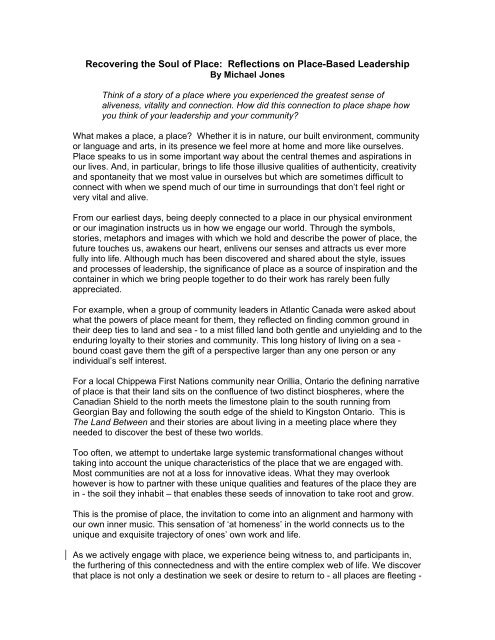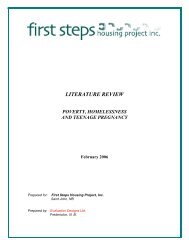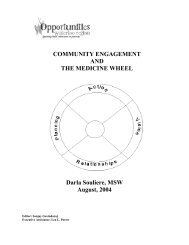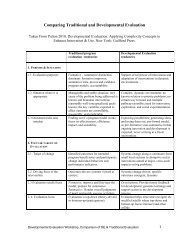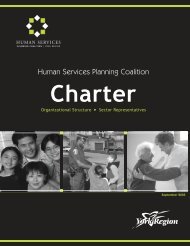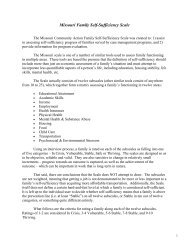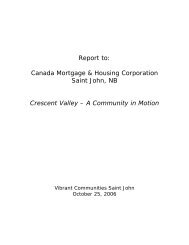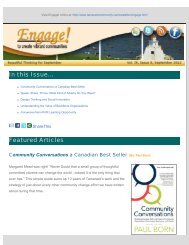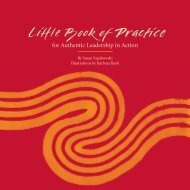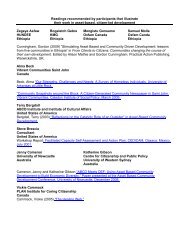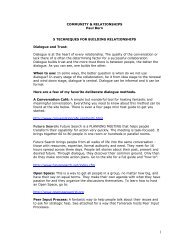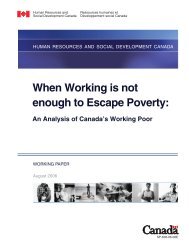Enage â Place based Leadership - Michael Jones Pianoscapes
Enage â Place based Leadership - Michael Jones Pianoscapes
Enage â Place based Leadership - Michael Jones Pianoscapes
Create successful ePaper yourself
Turn your PDF publications into a flip-book with our unique Google optimized e-Paper software.
Recovering the Soul of <strong>Place</strong>: Reflections on <strong>Place</strong>-Based <strong>Leadership</strong>By <strong>Michael</strong> <strong>Jones</strong>Think of a story of a place where you experienced the greatest sense ofaliveness, vitality and connection. How did this connection to place shape howyou think of your leadership and your community?What makes a place, a place? Whether it is in nature, our built environment, communityor language and arts, in its presence we feel more at home and more like ourselves.<strong>Place</strong> speaks to us in some important way about the central themes and aspirations inour lives. And, in particular, brings to life those illusive qualities of authenticity, creativityand spontaneity that we most value in ourselves but which are sometimes difficult toconnect with when we spend much of our time in surroundings that don’t feel right orvery vital and alive.From our earliest days, being deeply connected to a place in our physical environmentor our imagination instructs us in how we engage our world. Through the symbols,stories, metaphors and images with which we hold and describe the power of place, thefuture touches us, awakens our heart, enlivens our senses and attracts us ever morefully into life. Although much has been discovered and shared about the style, issuesand processes of leadership, the significance of place as a source of inspiration and thecontainer in which we bring people together to do their work has rarely been fullyappreciated.For example, when a group of community leaders in Atlantic Canada were asked aboutwhat the powers of place meant for them, they reflected on finding common ground intheir deep ties to land and sea - to a mist filled land both gentle and unyielding and to theenduring loyalty to their stories and community. This long history of living on a sea -bound coast gave them the gift of a perspective larger than any one person or anyindividual’s self interest.For a local Chippewa First Nations community near Orillia, Ontario the defining narrativeof place is that their land sits on the confluence of two distinct biospheres, where theCanadian Shield to the north meets the limestone plain to the south running fromGeorgian Bay and following the south edge of the shield to Kingston Ontario. This isThe Land Between and their stories are about living in a meeting place where theyneeded to discover the best of these two worlds.Too often, we attempt to undertake large systemic transformational changes withouttaking into account the unique characteristics of the place that we are engaged with.Most communities are not at a loss for innovative ideas. What they may overlookhowever is how to partner with these unique qualities and features of the place they arein - the soil they inhabit – that enables these seeds of innovation to take root and grow.This is the promise of place, the invitation to come into an alignment and harmony withour own inner music. This sensation of ‘at homeness’ in the world connects us to theunique and exquisite trajectory of ones’ own work and life.As we actively engage with place, we experience being witness to, and participants in,the furthering of this connectedness and with the entire complex web of life. We discoverthat place is not only a destination we seek or desire to return to - all places are fleeting -
ut also a presence we grow out from.In times when everything around begins to look the same and we are led to believe thatthere is no such thing as place any longer, we need to re-align around the more hopefulperspective. It’s a perspective that says that whoever we are and wherever we havecome from, our primary work now – as leaders and communities - is to tap into the deepgenerative power of place by taking up the work of being place-makers.When we engage with place we are also acted on by place. So as place-makers, ourprimary work is to ensure that each place we steward is free to express itself, as itself,through our work as leaders and in communities, in a manner that is true to its owndeepest nature.These insights set the context for a recent forum on <strong>Place</strong> Based <strong>Leadership</strong> andTransformational Change co hosted by the Fetzer Institute-funded, Powers of <strong>Place</strong>Initiative and Banff Centre <strong>Leadership</strong> Development. The forum was an opportunity tocome together to explore how our surroundings – nature, art, community and our builtenvironment – can partner with us as leaders to inspire and revitalize our leadershippractice as well as our organizations and communities.More specifically the forum hoped to create experiences that would help build alanguage for leaders who wish to utilize the power of place in their transformationalleadership work. It also sought to create a path forward for engaging communities intheir thinking about place and how it can transform their leadership and theirenvironments.Some of the realizations that came from these Banff dialogues on place-<strong>based</strong>leadership were that place itself is alive in our surroundings and in us and serves as asanctuary and source of belonging comfort and home in an uncertain world. Another ishow the mystery of place keeps hope and possibility alive. A third is how place teachesus about love- and particularly about how to love something so deeply that we learn tolove other – perhaps lesser things – later on. A fourth and perhaps most profoundrealization is how through place we learn to make a home for ourselves in the world.That rather than being separate and alien - the world is an intimate part of us just as weare an intimate part of it.By looking at place not only as something to return to but also something to grow outfrom –orienting us to the future and not only the past; and by realizing that a place is notan object or a thing, but a power and a presence, we can partner with place in a way thatis itself deeply transformative, opening our hearts to the experience of beauty, alivenessand possibility.<strong>Michael</strong> <strong>Jones</strong> is a leadership educator, writer and pianist/composer. He is on thefaculty at the Banff Centre <strong>Leadership</strong> Development and a Steward with the Powers of<strong>Place</strong> Initiative. He is currently writing a book on Recovering the Soul of <strong>Place</strong>: <strong>Place</strong>Based <strong>Leadership</strong> and Transformational Change. Visit <strong>Michael</strong>’s website at:www.pianoscapes.com


